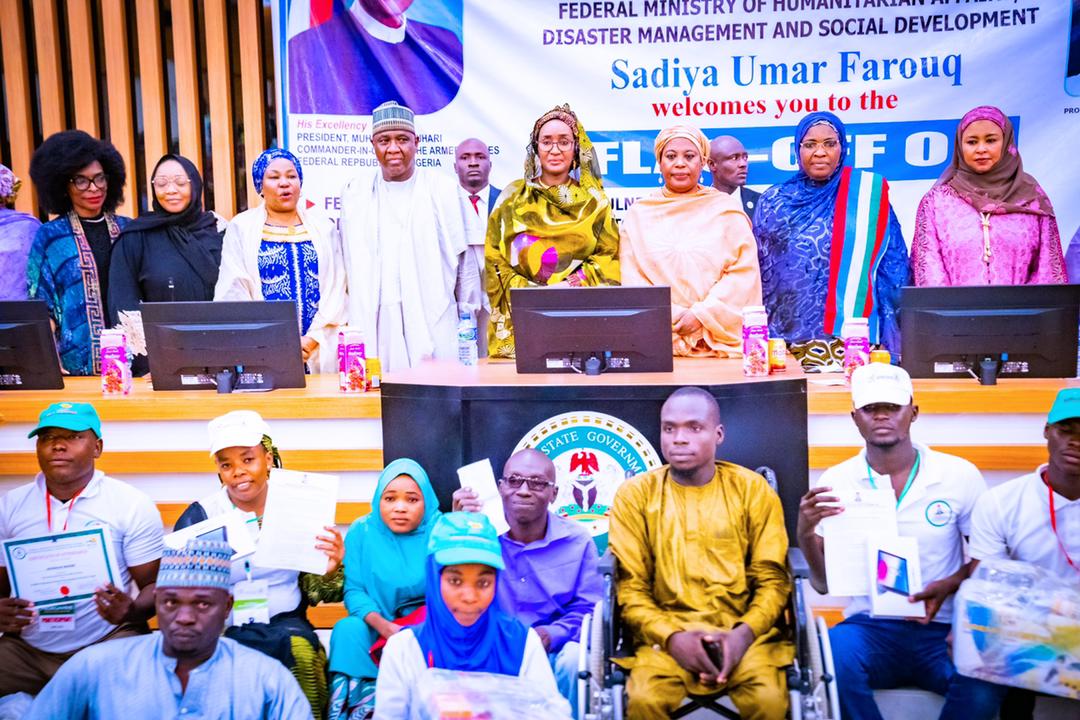By Chimezie Godfrey
Borno state ranks among the highest number of beneficiaries of the Cash Grant for Vulnerable Groups.
The Minister of Humanitarian Affairs, Disaster Management and Social Development Sadiya Umar Farouq made this known at the flag-off of the Cash Grant for Vulnerable Groups programme in Maiduguri on Wednesday.
Umar Farouq said that a total of 5,264 beneficiaries from across the 27 local government Councils of Borno state will receive the one-off cash grant of N20,000.
In her address delivered at the International Conference Centre, State Secretariat Maiduguri, the minister explained that Borno state ranks among the highest number of beneficiaries due to the impact of insurgency in the region.
“Our target in Borno State is to disburse the grant to 5,264 beneficiaries across the 27 Local Government Areas of the State. This is one of the highest slots in the country and this is because we put into account, the impact of insurgency and the large number of Internally Displaced Persons in the state.
“President Muhammadu Buhari, through his deliberate social inclusion agenda has directed that 70% of these beneficiaries must be women, while the remaining 30% is for the youths.
“He also directed that, at least 15% of the total number of beneficiaries must be allocated to citizens with special needs, including Persons With Disability (PWDs) and Senior Citizens in the State.
” It is on this note that we encourage the Borno State government to note and emulate this gesture and extend similar interventions to amplify social inclusion through its policies, programmes and projects”.
According to Umar Farouq, the target of the Cash Grant project is to increase income and productive assets of the target beneficiaries.
“It is highly expected that the beneficiaries will use the grant to improve their productivity, create wealth, generate employment and improve their living standard”.
Commending the Social Investment Programmes of the Federal government, the Executive Governor of Borno state, Prof. Babagana Umara Zulum expressed his gratitude to President Muhammadu Buhari for his concern for humanitarian issues in the state.
The Governor, who was represented by the Chief of Staff Prof. Isah Husseini Marte testified to the impact made on numerous beneficiaries by the various Social investment programmes.
“I hope that the ministry continues with these interventions as it has positively affected the lives of so many children, youths and women in Borno state.
“We acknowledge the far reaching benefits of these interventions to our vulnerable women and the reduction of unemployment among youths in the state”.
The minister later flagged off the Digitized Payment System for the Conditional Cash Transfer (CCT) Programme to improve payment, transparency, accountability and enable generation of reliable payment data and records.
“Benefitting households under this programme will be paid N5,000 monthly for 2 years. In addition, 1500 Internally Displaced persons will also receive a token of N50,000, including Persons with disabilities and senior citizens,” she said.
The Minister also distributed starter packs to 168 beneficiaries of the N-Skills scheme to enable them to consolidate on their technical and entrepreneurial skills.
She said each will also receive a stipend of N10,000 monthly during the period of training and attachment.
In a related programme, Minister Sadiya Umar Farouq onboarded 107 Independent Monitors in Maiduguri and presented engagement letters and monitoring devices to some of the monitors. Each will receive N30,000 monthly for one year..
Meanwhile, the National Sensitization Exercise for the National Home-Grown School Feeding Programme (NHGSFP) was also flagged off on Wednesday in Borno state.
The awareness programme seeks to educate communities and stakeholders on more effective ways of implementing the School Feeding Programme.
The inclusion of 5 million children approved by President Muhammadu Buhari added to an already existing 9.9 million children currently being fed nationwide, necessitated the sensitization on the implementation of the value chain.
In attendance were the Heads of the Ministry’s Agencies, Directors of the Ministry, women leaders and the state Focal Person.



